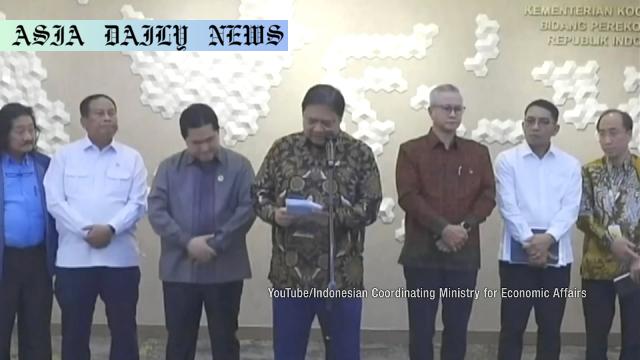Indonesia reveals $34 billion agreement to enhance US imports
Indonesia signs a $34 billion agreement with US partners.
Focus on boosting US energy and agriculture imports.
Hopes to secure lower reciprocal tariffs through the deal.

Indonesia Takes Significant Steps to Strengthen Economic Ties
Indonesia has announced a monumental agreement with its US partners, underlining its dedication to fostering positive bilateral trade relationships. The $34 billion deal primarily focuses on enhancing the importation of US energy and agricultural goods. This accord is seen as a powerful strategic move by President Joko Widodo’s administration to align closer with regional and global trade networks, ensuring the nation remains competitive in a rapidly evolving global marketscape.
Airlangga Hartarto, Indonesia’s Coordinating Minister for Economic Affairs, expressed optimism over the agreement, particularly its potential to ease reciprocal trade tariffs imposed by the US. With the Trump administration recently implementing a hefty 32 percent tariff on Indonesian imports, this deal provides an opportunity for Jakarta to foster economic resilience while aiming to reduce trade imbalances that had previously caused tensions.
Delving into the Details of the $34 Billion Deal
The agreement not only reflects Indonesia’s proactive stance in trade negotiations but also provides clear benefits to the US. By expanding energy and agriculture imports, Indonesia puts itself on a path of sustainable economic development while simultaneously catering to America’s export-heavy markets. US partners stand to gain considerably from this mutual collaboration, particularly in sectors facing surplus output challenges.
According to Hartarto, the emphasis on US energy imports aligns with Indonesia’s domestic needs, where energy consumption is projected to rise steadily. Similarly, agriculture importation from the US contributes to ensuring food security as Indonesia aims to mitigate supply-chain vulnerabilities. The move is emblematic of both nations’ shared goals of addressing mutual economic growth and prosperity.
Implications for the Global Market
This trade deal is bound to have ripple effects across the Asia-Pacific economic landscape. As Indonesia bolsters its relationship with the US, other Southeast Asian nations are likely to closely watch these developments and may consider similar trade alignment strategies. Vietnam’s recent announcement of its own US-centered trade agreement further highlights this emerging trend within the region.
For global markets, such bilateral arrangements reinforce the criticality of diversifying trade strategies amidst escalating tariff wars. The US, under the Trump administration, is clearly ramping up efforts to renegotiate trade balances, particularly with nations that hold trade surpluses. This could establish new economic precedents that both developed and emerging players will need to navigate.
Future Outlook for Indonesia-US Trade
Looking ahead, this historic $34 billion deal heralds expansive opportunities for Indonesia to fortify its economic standing. With new US investments and imports in its portfolio, the nation has decidedly positioned itself as a key player in the global economy. Reduced tariffs could provide welcome relief to exporters back home, fostering increased productivity and competition.
Furthermore, the pact serves as a roadmap for fostering trust and conducive trade practices between the two nations. While challenges remain, especially in ensuring the agreement’s implementation and enforcement, the anticipated benefits far outweigh the risks, showcasing Indonesia’s remarkable foresight in global trade negotiations.
Commentary
The Significance of the Indonesia-US Trade Deal
The $34 billion trade agreement between Indonesia and the US marks a crucial turning point in how nations recalibrate their trade strategies amid evolving global economic realities. This deal showcases Indonesia’s willingness to make impactful changes to strengthen its economy and foster sustainable growth. In an era where trade imbalances have become a significant point of contention for major economies like the US, Indonesia’s proactive steps are both commendable and strategic.
Indonesia’s Strategic Economic Moves
By committing to higher US imports—particularly in the energy and agricultural sectors—Indonesia is addressing domestic consumption needs while simultaneously appealing to American trade goals. This dual-purpose strategy aligns economic imperatives with diplomatic intentions. It represents a thoughtful compromise, considering the harsh 32 percent reciprocal tariffs imposed by the Trump administration. Undoubtedly, Indonesia is sending a clear signal: it is a reliable and adaptive partner in an unpredictable global trade environment.
Potential Benefits and Challenges
While the deal provides clear advantages for both nations, challenges remain. For Indonesia, managing the influx of US goods stemming from this deal will require careful balance to avoid potential disruptions to local industries. At the same time, the US needs to ensure that this agreement aligns with broader economic priorities, particularly in addressing its own trade deficits. If handled correctly, this accord could set a precedent for redefining trade relationships based on mutual respect and benefits.
A Model for Future Bilateral Agreements
Indonesia’s milestone agreement with the US serves as a valuable example for other nations. It highlights that by committing to constructive dialogue, countries can resolve even the most complex trade issues effectively. This deal could inspire other Asia-Pacific nations to negotiate trade agreements designed not only to boost their economies but also to foster long-term partnerships with major global powers. The implications of this accord will undoubtedly be felt in years to come, as nations observe the outcomes and consider similar negotiatory approaches.


